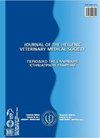饲粮正负离子差异变化对过渡期内荷斯坦奶牛钙状态、血液代谢产物及瘤胃活性的影响
IF 0.4
4区 农林科学
Q4 VETERINARY SCIENCES
引用次数: 0
摘要
负的饮食阴阳离子差(DCAD)诱导代偿性代谢性酸中毒,刺激产犊前钙(Ca)的吸收和动员,从而减少产后临床和亚临床低钙血症。本研究旨在确定不同产前和产后DCAD饲粮对孕产期荷斯坦奶牛血清总钙、离子钙、血液和瘤胃液代谢物以及产奶量的影响。54头多产荷斯坦干奶牛(n= 54)在预产前29天至产奶86天进行了完全随机区组试验设计。采用3 × 2的阶乘排列。产犊前饲喂3个DCAD水平(0、-120和-200 mEq/kg DM),每个处理n=18头奶牛;产犊后饲喂2个DCAD水平(+200和+400 mEq/kg DM),每个处理n=27头奶牛。与饲喂-120或0 DCAD的奶牛相比,饲喂-200 DCAD的奶牛预备尿液pH值较低。饲喂+400 mEq/kg DCAD的奶牛产后尿液pH值高于饲喂+200 mEq/kg DCAD的奶牛。与饲喂-120和0 DCAD的奶牛相比,饲喂-200 DCAD的奶牛预备血清总钙、离子钙和羟脯氨酸含量最高。与饲喂-120和-200 DCAD的奶牛相比,饲喂0 DCAD的奶牛甲状旁腺激素水平最高。制剂干物质采食量(DMI)在-200和-120 DCAD时低于0 DCAD。各治疗组产后DMI无显著差异。产前和产后DCAD治疗不影响总产奶量或乳脂,乳蛋白百分比不受产前和产后不同DCAD水平的影响。阴离子预备饲粮降低尿液pH值和甲状旁腺激素,提高血清羟脯氨酸,从而改善分娩后钙的可利用性。DCAD阳性(+200和+400 mEq/kg DM)的奶牛产后血液代谢物不受影响。低DCAD喂养的奶牛出生的小牛出生体重没有变化。初乳量和IgG浓度不受处理影响。未观察到产前或产后DCAD治疗对产奶量和脂肪矫正乳的影响。预备饲粮和产酸饲粮可改善多产荷斯坦奶牛产后钙水平。本文章由计算机程序翻译,如有差异,请以英文原文为准。
The Effect of Variation in Dietary Cation-Anion Difference on Calcium Status, Blood Metabolites and Rumen Activity during the Transition Period of Holstein Dairy Cows
A negative dietary cation-anion difference (DCAD) induces a compensated metabolic acidosis, stimulating calcium (Ca) absorption and mobilization before calving, thereby decreasing clinical and subclinical hypocalcemia postpartum. The study was designed to determine the effects of varying pre- and postpartum DCAD diets on serum total calcium, ionized calcium, blood and ruminal fluid metabolites, and milk production in prepartum and postpartum Holstein cows. Fifty-four multiparous dry Holstein cows n= 54, were enrolled in a completely randomized block experimental design at 29 days prior to expected parturition through 86 days in milk. A 3 x 2 factorial arrangement of treatments was utilized. Three DCAD levels were fed precalving (0, -120 and -200 mEq/kg DM), n=18 cows per treatment and two DCAD levels were fed post calving (+200 and +400 mEq/kg DM), n=27 cows per treatment. Prepartum urine pH was lower for cows fed -200 DCAD compared with those fed -120 or 0 DCAD. Postpartum urine pH was higher for cows fed +400 mEq/kg compared to cows fed +200 mEq/kg DCAD. Prepartum serum total calcium, ionized calcium, and hydroxyproline was highest for cows fed -200 DCAD compared to those fed -120 and 0 DCAD. Parathyroid hormone was highest for cows fed 0 DCAD compared to those fed -120 and -200 DCAD. Prepartum dry matter intake (DMI) was lower for -200 and -120 DCAD compared with 0 DCAD. Postpartum DMI was not different among treatments. Pre- and postpartum DCAD treatments did not affect total milk yield or milk fat, percentage of milk protein not affected by different pre-and postpartum DCAD levels. Prepartum anionic diets lowered urine pH and parathyroid hormone and raised serum hydroxyproline, resulting in improved Ca availability after parturition. Postpartum blood metabolites were unaffected in cows given positive DCAD (+200 and +400 mEq/kg DM). Calves born to cows fed low DCAD had no change in calf bieth weight. Colostrum amount and IgG concentrations were unaffected by treatments. No effects of pre-or postpartum DCAD treatments were observed for milk yield and fat-corrected milk. Feeding prepartum an acidogenic diet improved postpartum Ca status in multiparous Holstein cows.
求助全文
通过发布文献求助,成功后即可免费获取论文全文。
去求助
来源期刊

Journal of the Hellenic Veterinary Medical Society
VETERINARY SCIENCES-
CiteScore
0.60
自引率
0.00%
发文量
83
审稿时长
>12 weeks
期刊介绍:
The Journal of the Hellenic Veterinary Medical Society (J Hellenic Vet Med Soc) is a quarterly peer-reviewed journal that publishes articles in all aspects of veterinary science and related disciplines. It is published by the Hellenic Veterinary Medical Society and is indexed in the Web of Science and in Scopus.
There are no publication fees in the journal. Authors considering submitting manuscripts for evaluation and publication are requested to read carefully the instructions for authors and fully comply with them.
Non-complying manuscripts may be returned to the corresponding author for formatting.
 求助内容:
求助内容: 应助结果提醒方式:
应助结果提醒方式:


